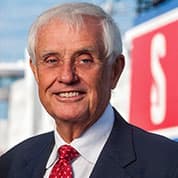STENA'S WORK WITH THE TRANSITION TO A
FOSSIL-FREE SOCIETY
Stena is already working to minimize environmental impact in our operations, but we are also investing for the future and taking an active role in the transition to a fossil-free society.
Making the transition to a fossil-free society is one of the biggest challenges of our time. Just like the frog that perishes in the pot that slowly heats up, we as individuals and society at large find it difficult to deal with slowly growing problems.
For us at Stena, it is quite obvious that we must make the transition to a fossil-free society, and we intend to be involved in making sure that this happens. In the meantime, however, we must ensure that we can conduct the operations presently needed by society.
Over 70% of world energy production comes from fossil resources. It is noteworthy that the use of coal, which has a larger negative impact than oil and gas, is still increasing.
Replacing coal with natural gas and oil is still a relatively inexpensive and effective first step toward decarbonization. Solutions that help the world eliminate its coal dependency should be given first priority over any other replacement.
The pathways toward decarbonization are different for different industries. The transport sector, representing approximately 25% of global CO2 emissions, will switch to electrification where possible and seek other solutions such as e-fuels or green hydrogen where electrification is not a viable option.
Stena supports the EU ambition to be the first non-fossil continent in 2050 and welcomes political initiatives to make this happen.
‘The EU Fit for 55’ is a comprehensive set of actions to support the private and public sectors in the transition, and we are in dialogue with the European Commission and others to ensure that the various actions relevant to Stena are carried out as effectively as possible. As a global company, we always prefer global regulation, especially for shipping although we understand that this is not always possible.
The shipping industry is regulated by the International Maritime Organization, and we strongly support the introduction of a global levy on CO2 emissions from vessels. This would provide a clear incentive to seek other sources of energy while retaining a level playing field. Funds generated from the levy should as a first priority support the decarbonization of third-world countries, as every dollar spent there will most likely be the best-spent dollar for the benefit of the planet.
Stena is well-positioned to take a leading position in the ongoing transition in shipping. We have the technical know-how and expertise from in-house R&D, and we have 10,000 onboard employees with in-depth operational expertise. In addition to this, we have close customer relationships with cargo owners, who rely on us to support them in their transitions.
We have identified three different ways to reduce CO2 emissions. The first is to increase our focus on energy efficiency. As energy will be a scarce resource going forward, we will strengthen our relentless focus on energy efficiency, and we need to do so from the technical, operational and strategic perspectives. The second focuses on new low-carbon fuels. For ferries, electrification is a viable future option. As an electric engine is much more efficient than any other fuel option, the future will probably be electric for the shorter ferry routes. With our knowledge from many EU demonstration projects such as Foresea, Stena Jutlandica ESS as well as Stena Battery Loop, we are well prepared to utilize this technology.
For longer shipping distances, electrification is not an option with today’s technology and new fuels must be developed. E-methanol is presently regarded as one of the most commercially available pathways towards reducing CO2 emissions for shipping and we were the first ship owner to convert a large vessel to methanol power back in 2015. Going forward, methanol is one of the pathways to reducing emissions, building on our experiences from the Stena Germanica. The partnership Stena Bulk has with the world’s second-largest producer of methanol exemplifies this pathway.
Electricity has to be clean if we are to reduce CO2 emissions as the world goes electric. Scandinavian Renewable Energy, formerly Stena Renewables, is a company started in 2005 by Stena Adactum. In August, Scandinavian Renewable Energy will be the second largest wind power company in Sweden, with a yearly reduction of CO2 emissions of 1.26 million tonnes, equivalent to 2.7% of all territorial emissions in Sweden. Stena’s share of the company is 20% and planned future investments to produce more sustainable electricity are huge.
For land-based power production, there is a need to quickly reduce the use of coal. Stena has technical solutions supporting the landing of gas in the form of LNG. The Stena Power & LNG Solutions terminals are situated near or offshore which makes them cost-efficient and quicker to establish. No land is required for our terminals, which reduces both investments and the necessary materials. The impact on the surroundings can thus be limited compared to fixed infra-structure.
It is not only energy that will be a scarce resource in the future. To stay within the boundaries of what our planet can sustain while continuing to lift people out of poverty, circularity of resources is key. Stena Metall is the largest recycling company in the Nordic countries. Its core business is to care for resources. Each tonne of ferrous scrap, aluminum or plastic that is recycled through its operations is a tonne less needed to extract at the cost of CO2 emissions, loss of water and biodiversity. For example, 1 tonne of recycled aluminum conserves 95% of the energy required to produce 1 tonne of virgin aluminum.
The strategic goal for Stena Recycling, a part of the Stena Metall Group, is to become our customers’ leading circularity partner by expanding the value proposition into services, for example by creating a new consulting service. Stena Circular Consulting is already helping several publicly traded to be more sustainable by becoming more circular. Stena Recycling has also launched Circular Solutions for helping companies like ABB and Alfa Laval with a commercial service for the recycling of inefficient equipment and replacement with new and efficient models that save energy.
It will take time to make the transition, but we at Stena have decided to be involved in leading this development in our various industries.







